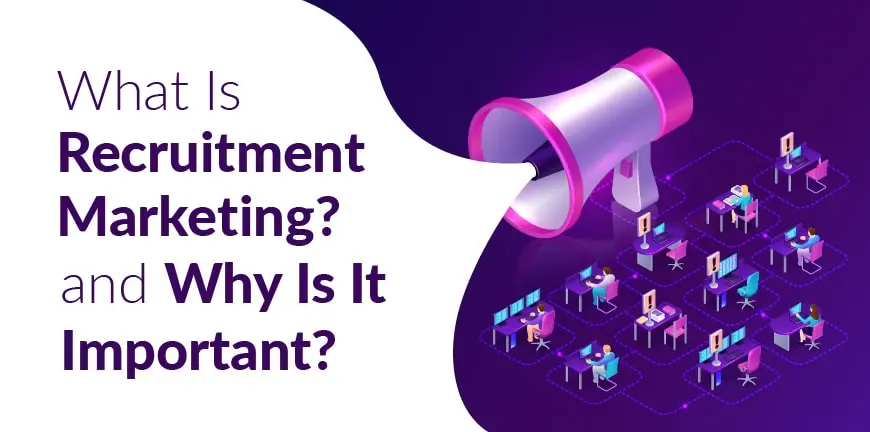
What is Accrued Payroll? Components and Calculations
30/11/2024India’s Silicon Valley Looking to Set up a GCC City
05/12/2024If you have been in the recruitment space for a while, you would have heard the recruitment marketing phrase being thrown around quite a bit. Recruitment marketing can make a big difference to the recruitment process itself. In fact, recruitment marketing is a key requirement to ensure you not only secure the right talent but manage the workforce as best as possible for the future.
Without proper recruitment marketing, recruitment will not pan out well – candidates who apply once will not return, those who are dissatisfied might air a negative opinion and so many other disadvantages exist. In this blog, we will understand what the meaning of recruitment marketing is, what its importance is, what the stages in recruitment marketing are, and how to create a recruitment marketing plan.
What Is the Meaning of Recruitment Marketing?
The process of drawing the attention of and engaging with prospective candidates during the pre-applicant phase of the recruitment process is referred to as recruitment marketing. In recruitment marketing, companies typically make use of social media platforms, omnichannel communication, and targeted messaging and automation to drive such intent.
What Is the Importance of Recruitment Marketing?
Recruitment marketing practices help build an employer brand. This is always helpful, but especially useful in tight labor markets, where there is increased competition for talent, and too few great talent options are available for companies. The principles of recruitment marketing, when applied correctly in such scenarios, can give a boost to the employer brand, increase engagement with the target audience, and helps collect feedback on how well the recruitment marketing process is working.
What Are the Stages of Recruitment Marketing?
Experts have drawn inspiration from the sales funnel when it comes to understanding the stages in recruitment marketing (not recruitment). Just as a customer moves down the sales funnel, finally ending in a purchase, the recruitment marketing funnel also starts with awareness and ends with the desired result, “application”. Experts differ on the number of steps in recruitment marketing, but here are the four stages according to us.
- Awareness – At this stage, the potential candidate is targeted and exposed to the brand.
- Engagement and Active Search – Here, the candidate takes action to explore the company and learn more.
- Expression of Interest – At this stage, the candidate expresses interest in applying for a job but does not actually apply.
- Application – The candidate applies for the job and is now waiting for the next steps in the recruitment process.
Recruitment marketing, therefore, takes care of the top part of the recruitment funnel, and the steps post the recruitment marketing stage are crucial to candidate experience. After the recruitment marketing stage, an applicant enters the final stages of the recruitment process itself, which includes the following:
- Screening
- Interview and evaluation
- Offer
- Hire
How to Create a Recruitment Marketing Plan?
Let us now see how we can create a recruitment marketing plan.
1. Set goals
In this step, you identify the hiring needs, establish the ideal candidate profile, and identify where your target audience will be.
2. Define roles
Who will be handling what part of recruitment marketing? You cannot have a single person manage the whole process. There must be a team, and each person must be tasked with a specific responsibility.
3. Identify recruitment channels
What are the channels you will be using for recruitment marketing and later for recruitment? These could be social media, company website pages, or third-party talent websites.
4. Allocate resources
Decide how much you can spend on different recruitment marketing activities based on the budget that has been assigned to you. Establish a deadline for the entire process, beginning with creating job description, engaging with the candidate, through to job application.
5. Create a content calendar
Create a content calendar with engaging blog posts and videos, webinars, interactive quizzes etc. and make sure that you have the resources to execute it. Use opinion polls to gauge audience engagement levels.
What are the Best Practices of Recruitment Marketing?
1. Use Good Content Marketing Techniques
Use good content in the form of blogs, videos, and even podcasts. Ask your employees to contribute and use the content they provide for your website, on your career pages and on the YouTube channel.
2. Social is Key
Post actively on social media to engage with prospective candidates. Passive talent will be encouraged to connect with you after they see the great posts you have made, possibly on CSR or diversity, or something else that deeply connects with them.
3. Use Employee Referral Programs
Current employees have a good understanding of the work environment in your company and the work-life balance you offer your employees. They can refer other employees who would be a great fit for the company.
4. Use Internal Subject Matter Experts
Make use of the subject matter experts you have in your company to create content that will inspire people to not just apply to your company but also establish your company as a source of genuine thought leadership.
5. Share Content Effectively
If you have posted a reel on Instagram, repurpose the content as a video for YouTube. You can even make a post on LinkedIn, adding a link to the video or creating a meme that is related to something that you feel strongly about and spoke about on the reel or video.
Frequently Asked Questions
1. What is the meaning of recruitment marketing?
Recruitment marketing is a process that uses strategies to draw the attention of and engage with potential candidates for filling a particular role. Recruitment marketing consists of several components such as employer branding, inbound recruiting, candidate experience management, and data analytics.
2. What is the difference between recruitment and recruitment marketing?
Recruitment is the process of hiring a candidate for the full-time role, starting with job posting, application shortlisting, screening, interviewing and ending with onboarding. The pre-application phases of recruitment are what involve recruitment marketing.
3. Is recruitment marketing a part of recruitment?
Recruitment marketing is clearly a part of recruitment. It is the first stage of recruitment and helps build and nurture a prospect before they apply for a role in the company. Recruitment marketing is crucial to the recruitment process itself.
4. How to use a recruitment marketing strategy?
To use a recruitment marketing strategy, one must first define the employer brand, set goals and assign roles, identify the target audience and then actually create compelling content. Only then can a recruitment marketing strategy be used.
5. What does a recruitment marketing specialist do?
A recruitment marketing specialist is responsible for implementing and managing the recruitment marketing process. They are also responsible for the strategization of the recruitment marketing process too, though in some cases, there may be a recruitment marketing manager to do this.
Contact Us For Business Enquiry

Amit Saproo
Amit Saproo is the Head of Operations at ALP Consulting with nearly 17 years of experience in Executive Search, RPO, Leadership, and IT & Engineering recruitment. He leads nationwide recruitment programs across Technology, BFSI, and R&D domains, driving strategic hiring solutions for diverse client needs. Amit excels in building and managing high-performance teams that deliver scalable, end-to-end recruitment and consulting services.



